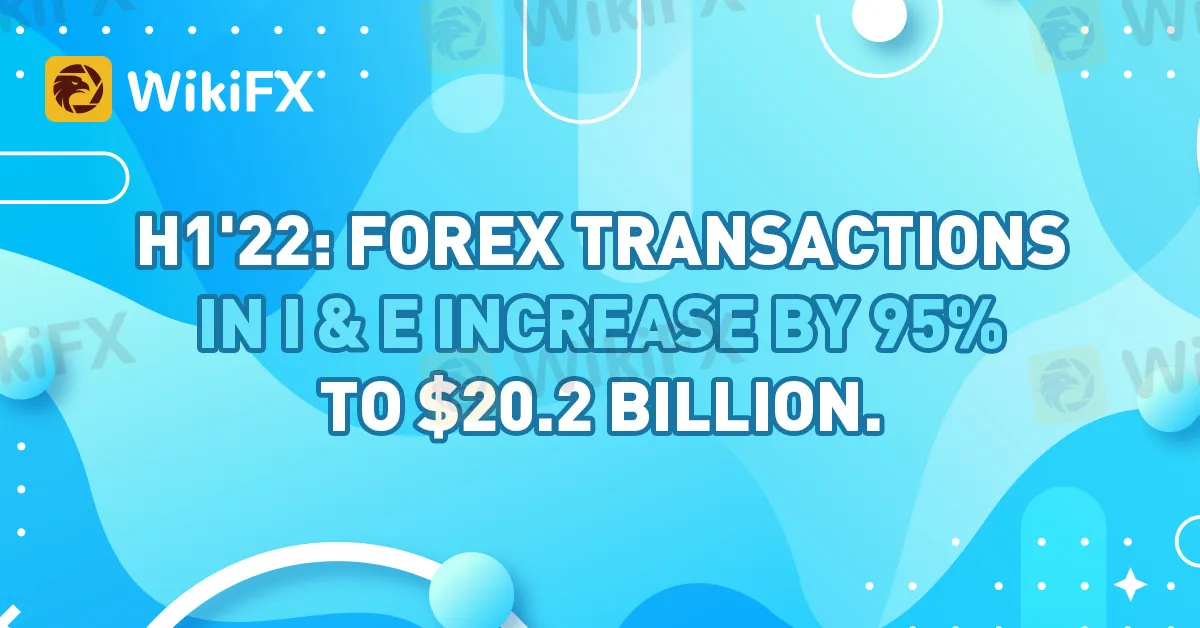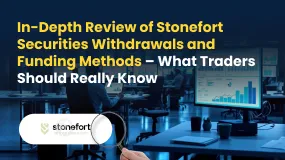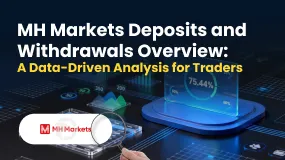简体中文
繁體中文
English
Pусский
日本語
ภาษาไทย
Tiếng Việt
Bahasa Indonesia
Español
हिन्दी
Filippiiniläinen
Français
Deutsch
Português
Türkçe
한국어
العربية
H1'22: FOREX TRANSACTIONS IN I & E INCREASE BY 95% TO $20.2 BILLION.
Abstract:The volume of dollars transacted (turnover) in the official Investors and Exporters (I&E) window, increased by 95% year on year (YoY) to $20.23 billion in the first half of the year (H1'22) from $10.34 billion in the same period last year.

· External reserves have decreased by 3.3 percent to N39.15 billion.
· Naira falls by 2.8 percent
The volume of dollars transacted (turnover) in the official Investors and Exporters (I&E) window, increased by 95% year on year (YoY) to $20.23 billion in the first half of the year (H1'22) from $10.34 billion in the same period last year.
However, according to a Vanguard study of transactions in the window provided by FMDQ, quarterly from 30% to $8.33 billion in the second quarter of 2022 (Q2'22) from $11.9 billion in the first quarter of 2022 (Q1'22).
In January, turnover was $3.22 billion, but it decreased 33.8 percent to $2.13 billion in February.
It increased by 207% in March to $6.55 billion, only to plummet by 59% in April to $2.63 billion. This trend continued in May, with turnover falling by 4.9% to $2.5 billion. In June, turnover increased by 28% to $3.2 billion, reversing the trend.
EXTERNAL RESERVES ARE DECREASING.
Reflecting the impact of declining dollar profits owing to increased fuel subsidy costs. This is apparent in the 36% drop in oil income in February, which the Central Bank of Nigeria, CBN, ascribed to Premium Motor Spirit value deficit recovery (petrol).
According to the Central Bank of Nigeria's monthly economic report, the country earned nothing in gas exports in January and February.
However, the nation's foreign reserves increased modestly by 1.7%, from $38.484 billion at the end of May to $39.155 billion at the end of June.
NAIRA FALLS IN VALUE.
The naira fell in both the I&E window and the parallel market in H1'22, reflecting the nation's declining foreign reserves.
The naira depreciated by 2.8% in the I&E window, to N425.05 per dollar at the end of H1'22 from N413.38 per dollar at the end of December 2021.
In the parallel market, the local currency depreciated by 6.0 percent, to N615 per dollar at the end of H1'22 from N580 per dollar at the end of December 2021.
Meanwhile, economists are concerned that the naira's downward trend would continue in H2'22 due to declining dollar inflows despite high demand pressure.
The importance of this approach is shown in the situation, which posted three consecutive quarters of surpluses in the second, third, and fourth quarters of 2021, following a period of deficits of more than 10 quarters.
“While Emerging Markets and Developing Economies, Nigeria faces a less severe risk due to the comparatively Foreign Portfolio Investments, FPIs, compared to pre-pandemic levels.” Nonetheless, an increase in the Monetary Policy Rate, or MPR, will reduce the yield gap and guarantee that Nigeria is competitive in destination for offshore capital.
POSITION OF EXPERTS
Analysts at FSDH Merchant Bank predicted that the I&E rate will reach N430 per dollar by the end of 2022.
“While the year-to-date performance of Nigeria's exchange rate on the I&E window continues on the gaining side, the recent performance signals growing pressure on the currency,” according to the company's macro assessment and prognosis for Nigeria, April 2022.
“At the end of Q1'22, the naira exchange rate increased by 4.3% to N416.25/$, up from N435/$ at the end of Q4'21.” However, due to a lack of Forex supplies, the currency fell to N419.5/$ on April 21, 2022.

Disclaimer:
The views in this article only represent the author's personal views, and do not constitute investment advice on this platform. This platform does not guarantee the accuracy, completeness and timeliness of the information in the article, and will not be liable for any loss caused by the use of or reliance on the information in the article.
Read more

Garanti BBVA Securities Exposed: Traders Report Unfair Charges & Poor Customer Service
Have you been financially ruined through chargebacks allowed by Garanti BBVA Securities? Do you have to wait for hours to get your queries resolved by the broker’s customer support official? Did the same scenario prevail when you contact the officials in-person? Failed to close your account as Garanti BBVA Securities officials remained unresponsive to your calls? Many have expressed similar concerns while sharing the Garanti BBVA Securities review online. In this article, we have shared some complaints against the broker. Take a look!

In-Depth Review of Stonefort Securities Withdrawals and Funding Methods – What Traders Should Really
For any experienced forex and CFD trader, the mechanics of moving capital are as critical as the trading strategy itself. The efficiency, security, and transparency of a broker's funding procedures form the bedrock of a trustworthy, long-term trading relationship. A broker can offer the tightest spreads and the most advanced platform, but if depositing funds is cumbersome or withdrawing profits is a battle, all other advantages become moot. This review provides a data-driven examination of Stonefort Securities withdrawals and funding methods. We will dissect the available information on payment options, processing times, associated costs, and the real-world user experience. Our analysis is anchored primarily in data from the global broker regulatory inquiry platform, WikiFX, supplemented by a critical look at publicly available information to provide a comprehensive and unbiased perspective for traders evaluating this broker.

MH Markets Deposits and Withdrawals Overview: A Data-Driven Analysis for Traders
For any experienced trader, the integrity of a broker is not just measured by its spreads or platform stability, but by the efficiency and reliability of its financial plumbing. The ability to deposit and, more importantly, withdraw capital without friction is a cornerstone of trust. This review provides an in-depth, data-driven analysis of the MH Markets deposits and withdrawals overview, examining the entire fund management lifecycle—from funding methods and processing speeds to fees and potential obstacles. MH Markets, operating for 5-10 years under the name Mohicans Markets (Ltd), has established a global footprint. With a WikiFX score of 7.08/10, it positions itself as a multi-asset broker offering a range of account types and access to the popular MetaTrader platforms. However, for a discerning trader, the real test lies in the details of its payment systems and the security of their funds. This article dissects the MH Markets funding methods withdrawal experience, leveraging pr

GAIN Capital Review: Exploring Complaints on Withdrawal Denials, Fake Return Promises & More
Is your forex trading experience with GAIN Capital full of financial scams? Does the broker disallow you from withdrawing your funds, including profits? Have you been scammed under the guise of higher return promises by an official? Does the GAIN Capital forex broker not have an effective customer support service for your trading queries? Concerned by this, many traders have shared negative GAIN Capital reviews online. In this article, we have discussed some of them. Read on!
WikiFX Broker
Latest News
The 350 Per Cent Promise That Cost Her RM604,000
In-Depth Uniglobe Markets Commission Fees and Spreads Analysis – What Traders Should Really Know
WikiFX's New Evaluation of ATM Capital LTD: Does its License Protect the Arab Investor?
Is Axi Legit? A Data-Driven Analysis of Its Regulatory Standing and Trader Feedback
How a Fake Moomoo Ad Led to the “New Dream Voyage 5” Scam
FXPesa Review: Are Traders Facing High Slippage, Fund Losses & Withdrawal Denials?
Trive Investigation: High Score, Hidden Risk - The Profit Paradox
CMC Markets Australia Revenue Surges 34%, But High-Net-Worth Clients Face Tax Phishing Threat
"Just 9 More Lots": Inside the Endless Withdrawal Loop at Grand Capital
GCash Rolls Out Virtual US Account to Cut Forex Fees for Filipinos
Currency Calculator



